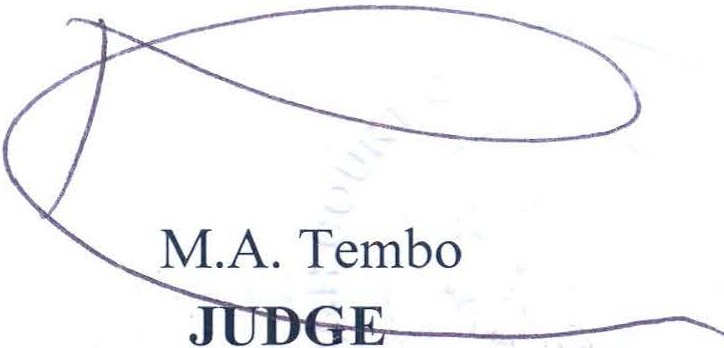
 IN THE HIGH COURT OF MALAWI PRINCIPAL REGISTRY
IN THE HIGH COURT OF MALAWI PRINCIPAL REGISTRY
MISCELLANEOUS CIVIL CAUSE NUMBER 115 OF 2016
IN THE MATTER OF SECTION 26 OF THE COURTS ACT
And
In the Matter of the review of the decision of the Senior Resident Magistrate Court sitting at Blantyre in Civil Cause Number 456 of 2016
BETWEEN
TIONGE RAMPI APPLICANT
v
FRACKSON RAMPI
CORAM: JUSTICE M.A. TEMBO
Mtegha, Official Court Clerk
RESPONDENT
ORDER
This matter was brought before this court, at the instance of the applicant, for this Court to exercise its supervisory and revisionary powers as provided in section 26 of the Courts Act. The revision pertains to the order of custody granted ex parte against the applicant and also the order of contempt of court made against the applicant on non-compliance with the ex parte order.
Section 26 of the Courts Act provides that
1


(1) In addition to the powers conferred upon the High Court by this or any other Act, the High Court shall have general supervisory and revisionary jurisdiction over all subordinate courts and may, in particular, but without prejudice to the generality of the foregoing provision, if it appears desirable in the interests of justice, either of its own motion or at the instance of any party or person interested at any stage in any matter or proceeding, whether civil or criminal, in any subordinate court, call for the record thereof and may remove the same into the High Court or may give to such subordinate court such directions as to the further conduct of the same as justice may require.
(2) Upon the High Court calling for any record under subsection (1), the matter or proceeding in question shall be stayed in the subordinate court pending the further order of the High Court.
This revision follows the making of an ex parte interlocutory order by the lower court, at the instance of the respondent, granting custody of a child of the parties to the respondent in the court below. The ex parte order granting custody was made pursuant to Order XII r 7 of the Subordinate Court Rules. The ex parte application itself only comprised an affidavit that was also commissioned by the presiding Senior Resident Magistrate as a Commissioner for oaths.
In the affidavit, the respondent essentially deponed that he was married at customary law to the applicant in 2013 and that he paid lobola. Further, that the applicant and the respondent have a single child who was in the custody of the applicant's parents at Mulanje. The respondent further deponed that the applicant deserted the matrimonial home and was staying at Chirimba. The respondent therefore asked for an order of custody of the child in view of the fact that he had paid lobola and therefore that the child was supposed to be with him.
Order XXII Subordinate Court Rules on applications, on which the lower court based its ex parte order, provides as follows
1. (1) Save as hereinafter provided, every application shall be made by means of a notice and affidavit in Form 6.
(2) If the application is in a pending proceeding it shall bear the heading and title of that proceeding.
(3) If the application is not in a pending proceeding it shall bear such heading and title as may be appropriate.
(4) The application shall state in full the nature of the order applied for and, in sufficient detail, the facts relied upon in support thereof, and unless the Court otherwise orders, shall be served on all parties and persons interested therein.
2. (1) The Court may in its discretion allow any application to be made orally on production by the applicant of an application form in Form 7 and on payment of the appropriate fee for an application. In such event the application form shall be completed by the Court and filed.
(2) The Court may direct that notice of any such application be given to any other party or person.
3. During the trial or hearing of any action or other proceeding any application arising therein may be made orally and without formality or fee, unless the Court shall otherwise order.
Applications, if contested, shall be heard in open Court.
5. The Court may as a condition of allowing any application impose such terms as may be just.
6. The Court may receive, by affidavit or orally, evidence in support of or in opposition to any application.
7. Subject to any Act, the Court may make such interlocutory orders as may be necessary to do justice between the parties whether applied for or not.
When the ex parte order was served on the applicant's parents they refused to comply initially on the applicant's instructions but eventually they complied and the child was released to the respondent. The applicant appears to have gone to another court to get relief against the ex parte order herein. In the foregoing circumstances, the lower court issued a summons for the applicant to show cause why she should not be committed to civil prison for contempt of court having failed to comply with the lower court's order.
This Court has perused the record of the lower court in this matter and notes the following fundamental anomalies in the manner the lower court proceeded.
First and foremost is the fact that the Subordinate Court Rules under which the interlocutory ex parte order was made is meant to provide for interlocutory orders generally. This was not the correct procedure to be used in a matter like the instant
one where the subject matter is custody of a child. It was incorrect for the lower court to proceed under the Subordinate Court Rules.
As the lower court is obviously aware, matters to do with custody of children are governed by specific legislation, namely, the Child Care, Protection and Justice Act. The lower court ought therefore to have proceeded under the Act and not the general Subordinate Court Rules.
Section 8 of the Child Care, Protection and Justice Act specifically provides for applications for custody of a child and the matters to be considered as follows
(1) A parent, a family member or any other appropriate person may apply to a child justice court for custody of a child;
(2) A family member or any other appropriate person may apply to a child justice court for periodic access to the child.
(3) The child justice court shall consider the best interests of the child and the importance of the child, on account of age, being with his mother when making an order for custody or access.
(4) In addition to the matters under subsection (3), a child justice court shall consider-
a) the views of the child;
b) that it is desirable to keep siblings together; and
c) any other matter the child justice court may consider relevant.
(5) Upon application for custody or access under this section the child justice court may make an order granting the applicant custody or the access to the child, and may attach such conditions as the court may consider appropriate.
A perusal of the record of the lower court in this matter clearly shows that the lower court did not at all address its mind to the requirements in section 8 (3) of the Child Care, Protection and Justice Act on making an order for custody that was made herein.
The lower court was moved only by the fact that the respondent paid lobola yet the section 23 (1) of the Constitution provides that all children, regardless of the circumstances of their birth, are entitled to equal treatment before the law, and the best interests and welfare of children shall be a primary consideration in all decisions
affecting them. The lower court did not comply with the constitutionally important principle of making decisions in the best interest of the child.
It is also extremely important that both parties should have been heard on the respondent's application for custody of the child instead of the lower court only hearing the respondent as it did. By hearing both parties the lower court would have properly decided what would be in the best interests of the child. Obviously, the payment of lobola and the fact that at custom the child belongs to the paternal side does not excuse the lower court from deciding whether that would be in the best interests of the child in the circumstances.
The foregoing elements make the decision of the lower court irregular. The interlocutory order is accordingly set aside. It is ordered that the respondent return the child to the applicant upon being served with this order.
Ifthe respondent wishes to pursue his claim to custody of the child, he must do so before another Child Justice Court and not the same court that sat in this matter for obvious reasons.
With regard to the order for contempt of court this court wishes to state the following. Section 54 of the Courts Act provides for contempt of court as follows
(1) A subordinate court may take cognizance of any contempt of court and may impose punishment for the same, not exceeding a fine of £5 or imprisonment for a term not exceeding seven days, and in default of payment of any fine imposed may commit the offender to prison for a term not exceeding seven days, unless the fine be sooner paid.
(2) In every case in which a subordinate court imposes any punishment under subsection (1), it shall without delay transmit to the Registrar for the consideration of the High Court under section 26, a statement certified to be true and correct of the grounds of and reasons for such imposition and shall also, if requested, furnish to the person committed or fined a copy of such statement certified as aforesaid.
The lower court properly summoned the applicant under order XXXI Subordinate Court Rules to show cause why she should not be committed to a civil prison or be fined for disobeying the lower court order.
This Court wishes to observe that it is clear from the record that when the applicant as asked to explain herself as to why she initially did not comply with the lower
court's order she kept alluding to the fact that she did not want to remain in marriage with the respondent. The lower court ended up finding her guilty of contempt of court in the circumstances and committed her to civil prison for five working days.
The lower court appears not to have considered the option of a fine instead of imprisonment when the punishment allows for both a fine or imprisonment. See for example Phiri v Blantyre Print and Publishing Company and others [1997] 1 JV1LR 183. There is no satisfactory explanation by the lower court why civil imprisonment was thought to be more appropriate in the circumstances. This is particularly the case given that the order that was made herein was made to take away custody of a child without hearing the lay contemnor. She obviously had genuine reservations as to why the lower court proceeded in such an irregular fashion. That explains her behavior towards the lower court's decision. In short, the committal for five working days was very harsh in the circumstances.
The order that was not complied with by the applicant having been found to be irregular and the committal itself having been found to be too harsh in the circumstances, it is ordered that the order of committal be set aside and the applicant continue with her liberty.
Made in chambers at Blantyre this 8th December 2016.
